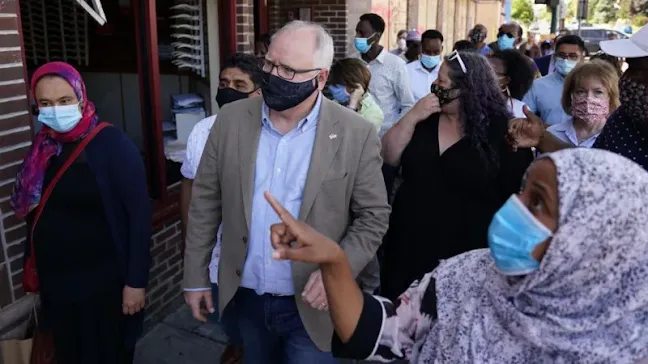Republicans have intensified their criticism of Minnesota Governor Tim Walz regarding his handling of the widespread protests that followed George Floyd's police killing in 2020. As Walz embarks on his campaign as Kamala Harris's running mate, detractors accuse him of mishandling the crisis by delaying the National Guard's deployment. The protests, which led to at least two deaths, over 600 arrests, and caused hundreds of millions in damages across Minnesota, have been a focal point of the criticism. In response, the Governor has defended his actions, asserting that his administration did its best under the challenging circumstances.
George Floyd's death at the hands of Derek Chauvin, a white Minneapolis police officer, ignited days of protests, some of which turned into riots and looting. The unrest quickly overwhelmed local authorities, leading Minneapolis Mayor Jacob Frey to ask Governor Walz to deploy the National Guard two days after Floyd's death on May 25, 2020. A separate written request for 600 troops came just hours later from the city’s police chief.
**Vibes and Jibes - Why Harris Chose Walz as Her Running Mate**
**'She Made a Smart Move': Democratic Voters Support Harris's Choice**
**Trump and Allies Criticize Walz as 'Dangerously Liberal'**
However, it wasn't until May 28—three days into the violence—that Governor Walz signed an executive order activating Minnesota's National Guard, citing "extensive damage to private property" and a "dangerous situation" for protesters and first responders. While some troops were deployed that night, their primary role was to protect federal buildings, and they were unable to prevent the riots, which included the burning of a local police station.
An unnamed local official described the situation in a 2022 external review for the Minnesota Department of Public Safety, saying, "We were abandoned. By the time the National Guard even arrived, most of the unrest had already quieted down." A separate October 2020 report by the then-Republican-controlled Minnesota Senate criticized Walz for not using force and law enforcement to stop the violence.
With Walz's recent announcement as Kamala Harris's running mate, Republican criticism of his handling of the 2020 protests has resurfaced. At a rally shortly after the announcement, Republican vice-presidential candidate JD Vance questioned whether "black business owners in Minneapolis are grateful" that Walz "allowed rioters to burn down their businesses."
The BBC has reached out to the governor's office for comment. Walz has defended his actions, stating that the city’s mayor did not provide him with sufficient information to effectively deploy the troops at that time. “Decisions were made in a situation that is what it is,” Walz said at a recent news conference. “And I simply believe that we tried to do the best we could in each of those.”
**How Did Tim Walz Respond to Floyd’s Death?**
Experts note that the situation in May 2020 was both complex and confusing. "Minneapolis city leaders were unfamiliar with the process for requesting National Guard assistance," said Duchess Harris, a professor of American Studies at Macalester College, who specializes in African-American political history and human rights. Harris, appointed by Walz to Minnesota's board of public defense, added, "It was unprecedented."
Several after-action reviews of the response to the riots point to communication breakdowns between city and state officials. A 2020 report from the city of Minneapolis highlighted that officials bypassed proper channels and contacted Walz directly to request troop deployment.
"Governor Walz, a 24-year veteran of Minnesota's National Guard, sought detailed information from the mayor," Harris noted. "That was his responsibility." The activation of Minnesota's National Guard at that time was the largest since World War II.
During the deployment, then-President Donald Trump tweeted, "when the looting starts, the shooting starts." Michelle Phelps, a sociology professor at the University of Minnesota and author of a book on the protests, suggested that a more aggressive response could have worsened the situation. "A more conservative governor escalating the response as Trump suggested might have led to increased violence and destruction," Phelps said.
Despite some criticism, civil rights leader Al Sharpton and other advocates have praised Walz for addressing social justice and police brutality issues effectively in the aftermath. Walz was re-elected as Minnesota's governor in 2022, two years after the protests.
Both Harris and Phelps anticipate that Republicans will continue to use Walz’s handling of the protests as a point of criticism. However, they do not expect it to be a significant liability among undecided voters. "It’s not surprising that Republicans are using this attack," Phelps said. "It shows that there are few weaknesses to exploit in Walz's record. I don’t think it will be particularly effective or decisive."





.webp)


0 Comments